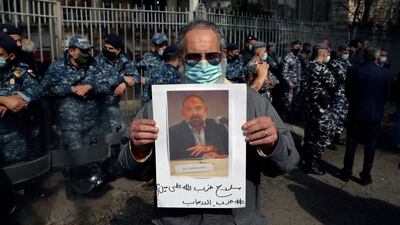Lebanese political commentator, publisher and long-time Hezbollah critic Lokman Slim was found shot dead in his car in south Lebanon, authorities said on Thursday.
Slim, 59, went missing on Wednesday evening at 8.30pm after leaving the house of a friend near the village of Niha, his wife Monika Borgmann told The National. He was supposed to return that night to his home in Ghobeiry, a southern suburb of Beirut.
Employees of the couple, who ran an NGO for documentation and research called Umam, went looking for Slim and found his phone on the outskirts of the village of Srifa in the night, Ms Borgmann said.
“All the time, there are threats against Lokman,” she said, when asked if her husband feared for his life.
The prominent activist's body was found later in a remote area between the villages of Addousiyeh and Tafahta in southern al Zahrani district. Pictures of Slim’s body, lying face down in a car, were published by local media.
The body was transferred to Saida's public hospital in south Lebanon. A medical examination revealed he had been shot four times in the head and once in the back, according to the state news agency.
"Unfortunately he's apparently been assassinated but we have to wait and see if it's on purpose or maybe just thieves, others," member of parliament Yassine Jaber told The National.
Asked how such a crime could be committed in an area totally controlled by powerful Hezbollah and Amal groups, he said: "There's nothing called complete control of anything in this area. If you go around at night, these are remote areas.
Mourning his death, Slim's sister Rasha Ameer said his killing was “a tragedy for Lebanon and the Arab world. He loved life and they took him. He was focused on life, friendships, travels, writing, books”.
“I lost a brother, a partner in work, a personal confident. My life is completely torn,” she said.
Lokman Slim - a life in pictures
"One cannot decide who did it yet, so let's see."
Mr Jaber's Liberation and Development bloc in parliament is led by veteran Speaker Nabih Berri and represents, with Hezbollah, the southern governorates.
Slim was a prominent critic of Hezbollah, the country's strongest Shiite party that controls much of southern Lebanon. It is also the only Lebanese party to operate a private militia and has thousands of fighters stationed in Syria and Iraq.
Slim was often the target of pro-Hezbollah press who labelled him among a group of figures who oppose their policies and were called “Shiites of the embassy”, in reference to their close ties with the United States and its embassy in Beirut. The US, as well as Gulf states, consider Hezbollah a terrorist organisation.
Despite regular threats against his life, Slim continued to live and travel in Hezbollah-controlled areas. He was a widely respected figure for his intimate knowledge of Lebanon’s history and social fabric.
During interviews, he shied away from highlighting threats against his life, though he stated them publicly in a letter in December 2019.
"You know that I prefer to not talk about that," he told The National during a meeting two weeks ago at his office in Ghobeiry.
Lebanon has in the past suffered many assassinations of prominent intellectuals and politicians who criticised Hezbollah as well as its close ally Syria, which occupied the small Mediterranean country from 1976 to 2005.
Hezbollah's media office did not respond to calls for comment on Thursday.


















